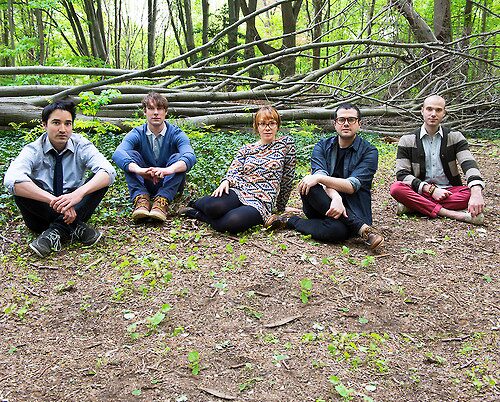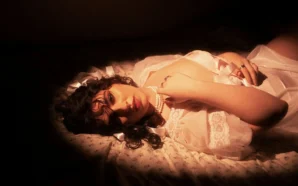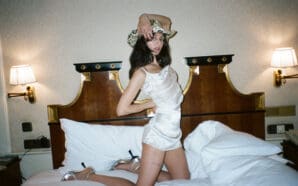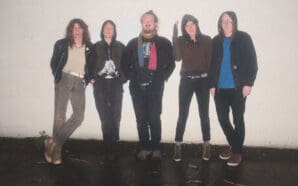I’m pretty sure I’ve covered Freelance Whales more than any other single musical act. The five-piece indie pop outfit (with both chamber pop and traditional folk overtones… making for something that first sounded a bit like what could be called “pre-twee”) of multi-instrumentalists got their start performing on the subway platforms of NYC. By the end of 2009 they released the brilliant Weathervanes, an LP that tells the story of a young man who falls in love with the ghost of the girl who haunts his childhood home. The album contains “Hannah,” a wonderful homage to Joe Swanberg’s mumblecore masterpiece Hannah Takes the Stairs and one of my favorite songs of recent years. The band spent all of 2010 and a good part of 2011 on the road. They hit up Philly more than half a dozen times, but it’s been a year and a half since we’ve heard from them. Well, out this Tuesday, October 9th, on Mom+Pop/Frenchkiss is their long-awaited sophomore LP, Diluvia. The album, which revolves around the idea of human survival and humanity itself as it could exist in various fantastical and futuristic scenarios. The album shows a band that is venturing beyond the “organic” instrumentation of their debut and boldly delving into synthetic territories. The sound is far less intimate than that of Weathervans, but no less poignant or powerful. In addition, the band are currently in the opening days of a month-long tour, which will find itself in Philadelphia on November 2nd, on the stage of Union Transfer. The day before Diluvia drops, I got a chance to chat with frontman Judah Dadone about this new sound, what to expect of the live show, and just what are his thoughts on the City of Brotherly Love and Sisterly Affection.
Izzy Cihak: Since this is a Philadelphia-based publication, I’m inclined to ask your thoughts on the city. You have quite a big following here. I’m not sure that you’ve ever played a show here that wasn’t sold out.
Judah Dadone: Yeah, we’ve been able to play some great places in Philly, starting with Kung Fu Necktie when we were a very young band, First Unitarian Church, The TLA, and Johnny Brenda’s. For me, personally, it’s really amazing to play these places, and even more amazing that people are actually coming out to the shows, because in High School (I grew up in Wilmington, Delaware) I used to come to a lot of those venues to see bands that I was totally infatuated with. I saw Sigur Ros at the TLA in 2001 and it totally changed my perception of what a live concert could do to a person emotionally. All of my great memories of going to shows in high school were from places like the TLA, Electric Factory, and The Tower Theater. I love the city for a million other reasons, too, especially the Chinatown (specifically Sang Kee’s Peking Duck House).
IC: Although you’ve done a lot of touring in-between, it’s been quite a while since you released an LP. How would you characterize the evolution of your sound, found on Diluvia, compared to your debut LP?
JD: I think it’s fair to say that Diluvia sounds a lot more unfettered and atmospheric. Weathervanes, in a way, was very tight, close, personal, but ultimately, restrained. That made sense, I think, considering the material and subject matter of the record. But Diluvia, I’d say, is a little more unhinged, wild, and spatial. At the same time, it also sounds a lot more like a band playing live together than Weathervanes did.
IC: What were the album’s biggest influences, whether musical or otherwise?
JD: Musically, the album is influenced by a lot of classical minimalism, and certainly a good bit of 80’s dream pop, here and there, but the soul of the record and a great deal of inspiration also comes from the bits of scoring that you might hear in scientific educational videos, and sci-fi movies that we might have watched in our early childhoods. I think that Carl Sagan’s Cosmos is a good example of something that might have influenced the record musically, lyrically, and in any other way imaginable.
IC: It’s been a while since you’ve been on the road and you’re playing your biggest headlining dates yet (by far). What can fans expect of the live show, compared to those that we experienced two years ago or so?
JD: The band sounds a lot more bionic now, I think. Our synth sounds are a lot girthier and more analog, although certain folkier elements still manage to shine through. I would hope that fans could come to a show expecting anything, and maybe nothing too specific. I think that some people have a very solidified notion of what we sounded like on Weathervanes, and I hope that people understand that we need to continue to try new things and challenge ourselves. But certainly, they can still expect to hear a lot of the old stuff, too!
IC: What are your post-tour plans? Anything already in the works for 2013?
JD: I imagine there will be a period where we experiment with a lot of new songwriting ideas, and instrumental ideas, and try to find a focal point for another collection of songs, which of course, are nowhere near their existence.
